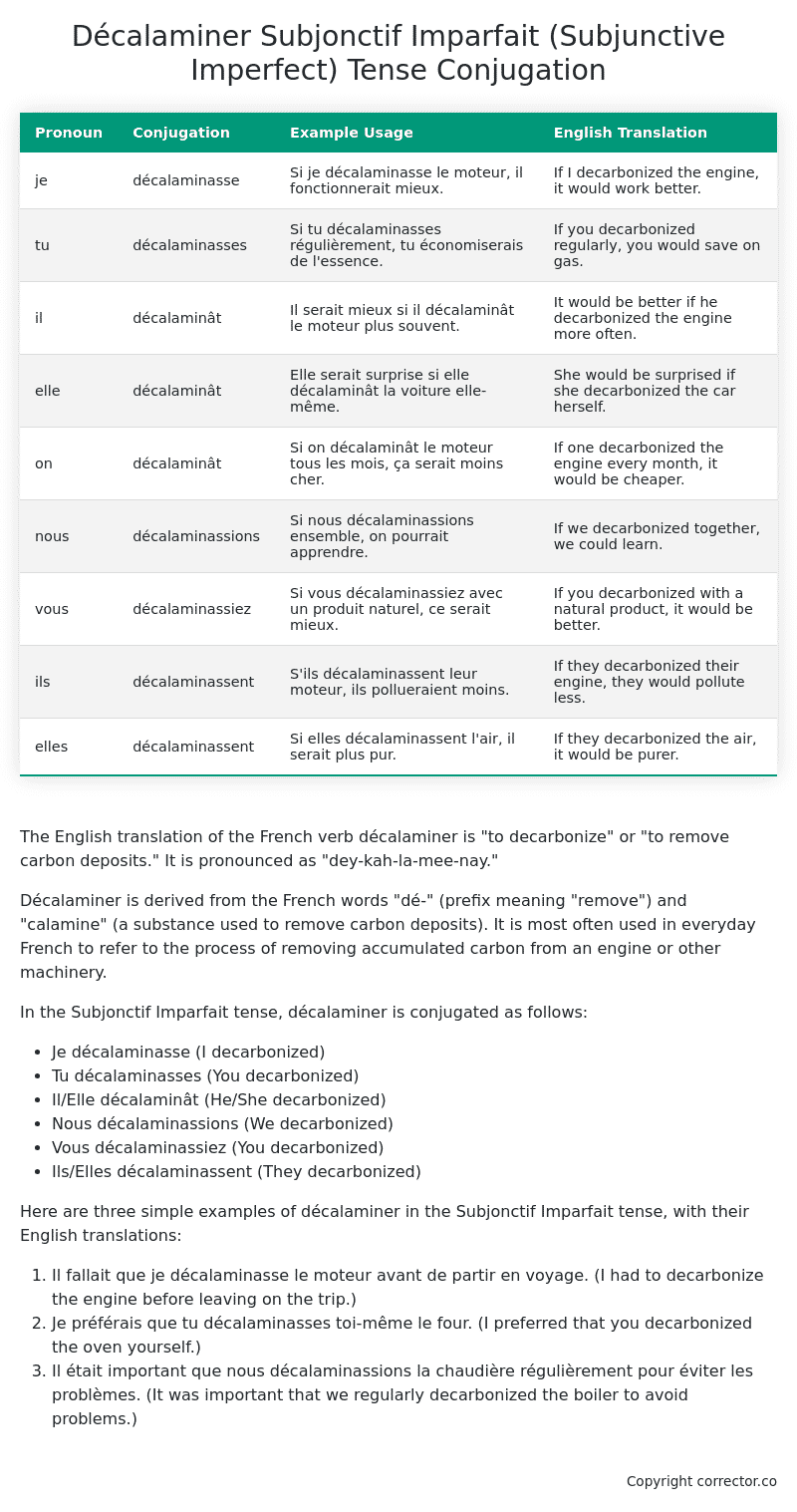Subjonctif Imparfait (Subjunctive Imperfect) Tense Conjugation of the French Verb décalaminer
Introduction to the verb décalaminer
The English translation of the French verb décalaminer is “to decarbonize” or “to remove carbon deposits.” It is pronounced as “dey-kah-la-mee-nay.”
Décalaminer is derived from the French words “dé-” (prefix meaning “remove”) and “calamine” (a substance used to remove carbon deposits). It is most often used in everyday French to refer to the process of removing accumulated carbon from an engine or other machinery.
In the Subjonctif Imparfait tense, décalaminer is conjugated as follows:
- Je décalaminasse (I decarbonized)
- Tu décalaminasses (You decarbonized)
- Il/Elle décalaminât (He/She decarbonized)
- Nous décalaminassions (We decarbonized)
- Vous décalaminassiez (You decarbonized)
- Ils/Elles décalaminassent (They decarbonized)
Here are three simple examples of décalaminer in the Subjonctif Imparfait tense, with their English translations:
- Il fallait que je décalaminasse le moteur avant de partir en voyage. (I had to decarbonize the engine before leaving on the trip.)
- Je préférais que tu décalaminasses toi-même le four. (I preferred that you decarbonized the oven yourself.)
- Il était important que nous décalaminassions la chaudière régulièrement pour éviter les problèmes. (It was important that we regularly decarbonized the boiler to avoid problems.)
Table of the Subjonctif Imparfait (Subjunctive Imperfect) Tense Conjugation of décalaminer
| Pronoun | Conjugation | Example Usage | English Translation |
|---|---|---|---|
| je | décalaminasse | Si je décalaminasse le moteur, il fonctionnerait mieux. | If I decarbonized the engine, it would work better. |
| tu | décalaminasses | Si tu décalaminasses régulièrement, tu économiserais de l’essence. | If you decarbonized regularly, you would save on gas. |
| il | décalaminât | Il serait mieux si il décalaminât le moteur plus souvent. | It would be better if he decarbonized the engine more often. |
| elle | décalaminât | Elle serait surprise si elle décalaminât la voiture elle-même. | She would be surprised if she decarbonized the car herself. |
| on | décalaminât | Si on décalaminât le moteur tous les mois, ça serait moins cher. | If one decarbonized the engine every month, it would be cheaper. |
| nous | décalaminassions | Si nous décalaminassions ensemble, on pourrait apprendre. | If we decarbonized together, we could learn. |
| vous | décalaminassiez | Si vous décalaminassiez avec un produit naturel, ce serait mieux. | If you decarbonized with a natural product, it would be better. |
| ils | décalaminassent | S’ils décalaminassent leur moteur, ils pollueraient moins. | If they decarbonized their engine, they would pollute less. |
| elles | décalaminassent | Si elles décalaminassent l’air, il serait plus pur. | If they decarbonized the air, it would be purer. |
Other Conjugations for Décalaminer.
Le Present (Present Tense) Conjugation of the French Verb décalaminer
Imparfait (Imperfect) Tense Conjugation of the French Verb décalaminer
Passé Simple (Simple Past) Tense Conjugation of the French Verb décalaminer
Passé Composé (Present Perfect) Tense Conjugation of the French Verb décalaminer
Futur Simple (Simple Future) Tense Conjugation of the French Verb décalaminer
Futur Proche (Near Future) Tense Conjugation of the French Verb décalaminer
Plus-que-parfait (Pluperfect) Tense Conjugation of the French Verb décalaminer
Passé Antérieur (Past Anterior) Tense Conjugation of the French Verb décalaminer
Futur Antérieur (Future Anterior) Tense Conjugation of the French Verb décalaminer
Subjonctif Présent (Subjunctive Present) Tense Conjugation of the French Verb décalaminer
Subjonctif Passé (Subjunctive Past) Tense Conjugation of the French Verb décalaminer
Subjonctif Imparfait (Subjunctive Imperfect) Tense Conjugation of the French Verb décalaminer (this article)
Conditionnel Présent (Conditional Present) Tense Conjugation of the French Verb décalaminer
Conditionnel Passé (Conditional Past) Tense Conjugation of the French Verb décalaminer
L’impératif Présent (Imperative Present) Tense Conjugation of the French Verb décalaminer
L’infinitif Présent (Infinitive Present) Tense Conjugation of the French Verb décalaminer
Struggling with French verbs or the language in general? Why not use our free French Grammar Checker – no registration required!
Get a FREE Download Study Sheet of this Conjugation 🔥
Simply right click the image below, click “save image” and get your free reference for the décalaminer Subjonctif Imparfait tense conjugation!

Décalaminer – About the French Subjonctif Imparfait (Subjunctive Imperfect) Tense
Formation
Common Everyday Usage Patterns
Interactions with Other Tenses
Subjonctif Présent
Indicatif Passé Composé
Conditional
Conditional Perfect
Summary
I hope you enjoyed this article on the verb décalaminer. Still in a learning mood? Check out another TOTALLY random French verb conjugation!


